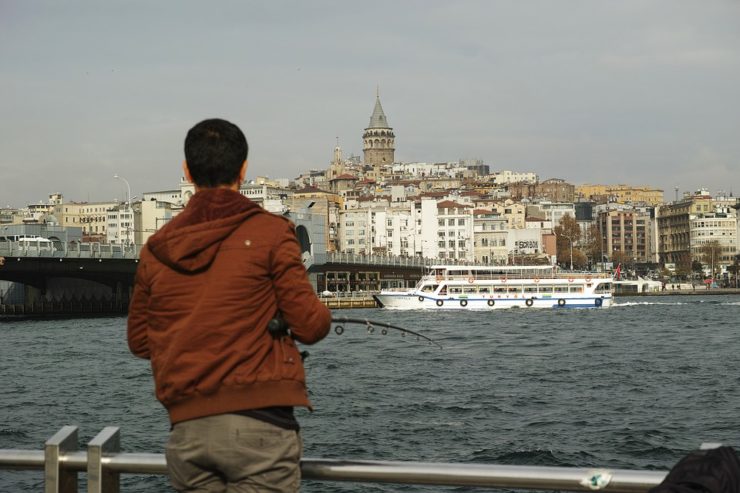Things are wrong with these people in this country. Relative security and commercial opportunities turned their heads. Where are my homies, for whom the most important thing was brotherhood, supporting each other in good and bad times? Morality collapses. – thought the modest merchant from Mecca, about the nature of a philosopher, who, apart from having a rich spiritual life, willingly supported the poor with alms, thought a lot.
The merchant’s particular concern was his people – the Quraysh. What can I say – they were doing well. They had traded successfully for years – thanks to the fact that their recent ancestors invented the saddle – now all goods could travel on camel backs through many, distant countries, and Mecca, which was already a place of worship in 610, now became something like the world’s marketplace.
So it was going well. And yet our philosopher suffered looking at people who were consumed by…. Materialism. People, including immediate family members, fought with each other for prestige and wealth. The spirit of family ties disappeared, and society – according to the philosopher – was experiencing a moral crisis.
Bedouins, who so far lived off the seizure of foreign property by invasions (Ghazu), began to feel confused in this changing world, growling at one another, and this state was called jahiliyya or „irritability”, as the terminology explains: „constant sensitivity to matters of honor and prestige, excessive arrogance, and above all – a chronic tendency to violence and retaliation ” [1]
Will this situation end in war? Is this the end of safe trade in Mecca? Will the division between people deepen?
The merchant, after many fasts and prayers, had a revelation similar to that of Isaiah or Ezekiel and decided to act. He gathered people around him to remind the whole society of the message of Abraham – their forefather, which was given a new frame in the form of the Koran. The message was extremely simple; to join, not to divide, and if to share … let’s share … WITH the poor, instead of accumulating your own wealth. Take care of and treat everyone, including the defenseless and the poor.
In this way, under the „leadership” of Muhammad, Muslims created an „umme” or community which, we read, „constituted an alternative to the greed and systemic injustice of Mecca’s capitalism” [2]. The faith that was originally called tazzaka („perfection”) then took the name Islam – meaning one hundred percent submission to God / Allah. The term embraced every good matter: caring for orphans, widows, and the needy, and turning away from accumulating a fortune.
Soon, such qualities as sensitivity, patience, mercy, gentleness, i.e. the traditional Arabic virtue known as hilm, began to be practiced. It was supposed to displace the Jahiliya, which was constantly insatiable. The new adherents of hilm remained unmoved by the aggression, and by themselves responding with good, they believed that it was and only in this way that they could change the world for the better.
Socially, submission to Islam meant that one had to learn how to live in community: the followers were to discover their deep connection with other human beings, whom they tried hard to treat as they themselves would like to be treated.
„Neither of you can be a true believer,” Muhammad had said, „unless he desires for his neighbor what he desires for himself.” [3]
And then we read:
Muslims achieved submission to Islam by taking responsibility for one another and sharing with those in need. In the churches founded by Saint Paul, the rich and the poor were to sit at the same table and eat the same food. [4]
Mahomed himself, just as his social role began to change, was described by his wife, Khajijah, as follows:
“You are tender and caring for your loved ones. You help the poor and the abandoned by bearing their burdens. You are trying to restore the high moral ideals that your people have lost. You respect your guest and help people who have suffered a misfortune. ” [5]
Has the umma started disturbing anyone? Of course. It didn’t take long for the ruling class to speak. If you don’t know what’s going on, it’s about money – and in this case it’s about trading. The moment Muhammad started preaching monotheism, the chamber of commerce felt concerned – after all, every year thousands of Arabs flocked to Mecca to worship numerous deities, thereby supporting the country’s economy!
Soon Muhammad became the leader of the exile with the crowd following him. And right after that, he is a peacemaker of groups of emigrants fighting each other, trying to unite what has begun to fall apart. After breaking one of the most important Arab rules – when the Qurayshites who chose peace for the first time – accidentally killed a merchant from Mecca, everything changed….
However, the umma was an invention of a genius man – no one had ever managed to do something like this: to unite all the Arab tribes into one community.
Mohamed firmly believed that his Allah (that is simply God) is g / God of Jews and Christians at the same time, he longed for a prophet who would free his people from all these tensions – he did not think that he was to become one himself.
Both he and his brethren, although proud, sticking together and godly, for centuries fell victim to the ridicule of … Jews and Christians. Both mocked them that they were so saints, and they had neither the revealed word of God (like the Jews, the Torah and Christians the Bible) nor the prophet. The Arabs had a sense of spiritual inferiority while admiring the two big religions then, but they refused to join – they felt instinctively that it was not theirs, and they did not want to belong to the system that was used to strengthen the empire’s power.
But Mohamed, who was a broad-minded man who was very curious about the world, did not give up; he liked Judaism and wanted to learn as much as possible about it – preferably at the source. He got up from his seat and went for knowledge and inspiration. Almost immediately, he ordered „his” people to fast, not to eat pork (and it is still the case today), and to pray with their faces turned towards Jerusalem.
Although the Jews from Medina were initially happy to help Mohamed, they explained many things to him about their religion, and they quickly rejected him. He was probably too impartial for them, not oriented to the conflicts that gave them power. As we read:
(Jews) gathered in the mosque to hear stories from Muslims and to make fun of their religion. [6]
Finally, when Mohamed had a personal encounter with God and gained the written word for his people, he experienced the greatest disappointment in his life – that is, rejection by the Jews.
How the Koran came about
What is our true religion? Where are we heading? How can I find peace and what is the truth ?!
„Oh God, if I knew how to worship you, I would worship you as you please, but I don’t know!” [7]
– Mohamed exclaimed during the next day of Ramadan, in his hermitage.
And he got the answer. One night, awakened from sleep, he felt an overwhelming divine presence overwhelm him. Then he heard the order „Recite!” Although Mohamed resisted the Angel three times, in the end the Word of God was given in Arabic and received the name Al-Kur’an, or recitation.
And Mohamed…. he no longer wanted to live!
In the eyes of his imagination he saw himself as one of those possessed, charismatic Arab seers (kahin) to whom people rush with just a trifle. He didn’t want this !. But he had nowhere to hide when the creature that introduced itself to me by name appeared to him over and over:
„O Muhammad! You are God’s messenger and I am Gabriel. ” I raised my head to the sky to see who was speaking like that (…) I turned my face away, but wherever I looked in the sky, I saw his form everywhere. [8]
Mohamed’s experience was known in the Jewish world as the kodesh – the holiness or otherness (holy actually means „set apart”) of God – his overwhelming presence. And like some of the Jews who experienced the Kodesh, Mohamed experienced such a devastating God’s presence that he described the condition as shocking, close to death.
Mohammed was split. On the advice of his wife, he decided to consult one of his wise cousins, and the choice fell on Warakwa ibn Nawfa, who had previously converted to Christianity and was a scribe. He had no doubts that Mohammed had experienced the revelation of the God of Moses and had become His messenger to the Arabs.
Several years passed before Mohammed accepted this and began to play the role of a prophet – and began by „receiving” the words of the Koran; line by line, for 23 years….
During the revelation of the Koran, Mohammed experienced various emotional states as well as specific instructions from the Creator, among others that he should remain wise passive without trying to rush the flowing words.
What happened to Muhammed next? I read about it all night. And then another, and another, because the author, Karen Armstrong, shares with the reader a knowledge so insightful, accurate that her books read like the documented „Fairy Tales of 1001 Nights”. For now, I leave you with a quote:
“When Muhammad began preaching in Mecca, he had a modest image of his role. He did not think he was the founder of a new universal religion, he just thought he was bringing the old religion of one God to the Quraysh. At first, he even believed that he should not preach to other Arab tribes, but only to the inhabitants of Mecca and the surrounding area.
He did not dream of creating a theocracy (…) His first message was not about annihilation. He preached joyful, hopeful news. ” [9]
and reflection. However, if you are looking forward to the next part – I highly recommend two of the best books I have read – “Blood Fields. Religion and Violence „by Karen Armstrong and” The History of God: 4,000 Years of God’s History in Judaism, Christianity and Islam „by the same author.
You can also read this text in POLISH
Wanna comment? Go below of facebook CLICK
[1] „Fields of blood: Religion and the history of violence” by Karen Armstrong, 2014
[2] Therein
[3] Therein
[4] Therein
[5] Therein
[6] Therein
[7] Therein
[8] Therein
[9] Therein



